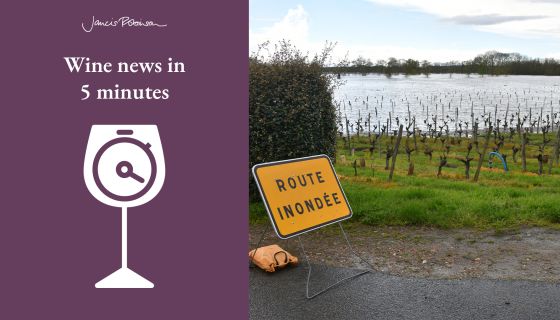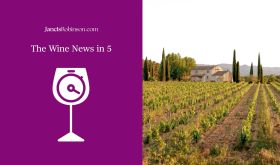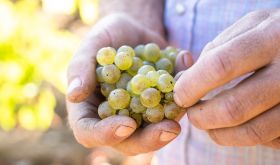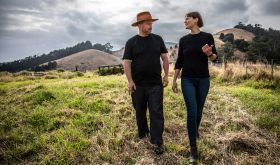Before I dig into the news, I want to remind you that Jancis has events coming up on the east coast of the US; find details on our where to find us page. I also want to suggest you keep your eyes peeled for an article coming out this Wednesday called ‘Gone with the wind – wine by sail’, which details the growing trend of shipping wine by sail.
Harnessing nature's power
In mid March the American Society for Enology and Viticulture (ASEV) selected ‘Biological control of Botryosphaeria dieback of grapevines in British Columbia, Canada’, authored by Pollard-Flamand, Boulé, Hart and Úrbez-Torres, as the best scientific paper in viticulture of 2023.
Botryosphaeria dieback is a grapevine disease caused by certain fungi. Outside market forces and climate change, fungal issues are one of the biggest challenges facing viticulturists. They pose more consistent issues than bacteria, viruses or physical pests. But many can be treated with regular sprays of fungicides. (As an aside, this isn’t a grape-specific issue. Peaches, pears, cherries, citrus, strawberries, raspberries, tomatoes and more all undergo similar spray programmes to combat fungal disease.)
But some forms of fungal disease are not treatable. And Botryosphaeria dieback is one of them. It’s a particularly nasty form of fungus that, left to its own devices, will spread through a grapevine or an olive tree or any number of woody trees and shrubs and kill tissue, cut off water flow and eventually kill the plant. Any wound on a plant, be it a pruning wound or bark scrapped off from an animal, will suffice for an entry point for the fungus. If a plant is weak from drought, it is more susceptible. And there is very little you can do to stop the fungus once it has infected a plant. Standard procedure is cutting out the infection, burning the infected material and applying a fungicide paint either by hand or by spraying – but as this study mentions, many of the active ingredients that have proven most effective in paints have been banned due to concerns over human and environmental health.
So, biological control.
Biological control refers to using one organism to control another, such as releasing ladybugs to control an aphid population. This latest study evaluates the fungus Trichoderma – present in all soils and assisting in decomposition – on preventing the spread of the fungi leading to Botryosphaeria dieback.
This isn’t a revolutionary idea. Trichoderma has proven so effective as a biological control against fungi, bacteria and nematodes that it is included in over 60% of biological-control agricultural products. But this study used locally cultivated Trichoderma, specifically looked at the impact on Botryosphaeria, and found the treatment to be effective for 60 days and as or more effective than commercial products.
This study will, perhaps, convince more people of the controls that nature provides. But this isn’t surprising. Biodynamic and responsible organic practitioners have known this for ages. Do you know what the decomposition of manure in cow horns (aka preparation 501) diluted for spraying or compost teas created with new compost contain hefty populations of? Trichoderma.
It is unsurprising that local strains of Trichoderma would work well for combating local Botryosphaeria fungi, seeing as they developed alongside each other, whereas commercial biocontrol products are likely using a strain of Trichoderma that developed somewhere else alongside a different strain of Botryosphaeria fungi.
I’m glad science continues to prove things that many have scoffed at since chemical fertilisers and pesticides became prevalent after WW2. But if farmers are still attempting to wipe out negative pests rather than build up a beneficial counter-population, I’ll quote Dr Ian Malcolm in Jurassic Park: ‘Life finds a way.’
Personally, I’d rather the life be something beneficial or benign.
The rain (not) in Spain
On 31 March a quarter of the vineyards in Chinon experienced flooding when the Vienne River rose to a height of 6.13 m (20 ft). Vineyards were submerged by as much as two metres of water. By 4 April there were, according to Vitisphere, only a couple centimetres of water remaining in vineyards. Growers are not worried about long-term damage but are concerned about mildew pressure.
Meanwhile in Spain, national meteorological agency AEMET reported that the country had an average temperature of 9.5 °C (49.1 °F) in the first quarter of 2024. This is higher than the previous record set in 1997 and likely the highest average temperature since records began in 1961. The country has been in a drought for the last three years and, in February, Barcelona declared a drought emergency. Tenerife in the Canary Islands followed with a declaration in March. While a very wet March alleviated pressure in many areas, Catalonian reservoirs still remain at 16–17% of capacity and would need to go up to 27–28% for emergency measures to be lifted.
Majestic acquires Vagabond
The UK’s largest specialist retailer, Majestic, who have over 200 stores and 1,000 employees, announced on 5 April that they had acquired wine-bar chain Vagabond Wines and were taking over nine physical locations. Vagabond Wines is known for its self-serve wine dispensers and boasts over 100 wines by the glass. Majestic has said they plan to expand the business.
This is a transcript of our weekly five-minute news broadcast, which you can watch below. You can also listen to it on The JancisRobinson.com Podcast. If you have breaking news in your area, please email news@jancisrobinson.com. And if you enjoy this content and would like to see more like it, please subscribe to our site and our weekly newsletter.













